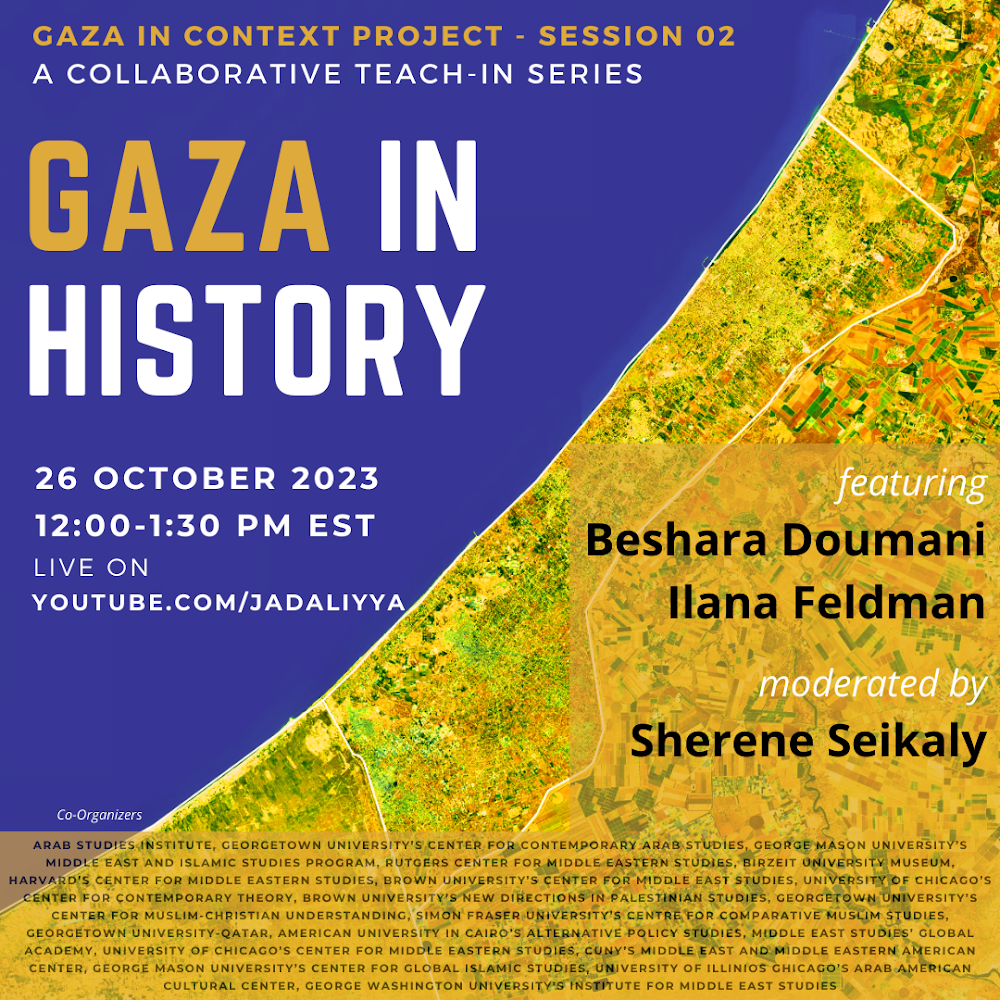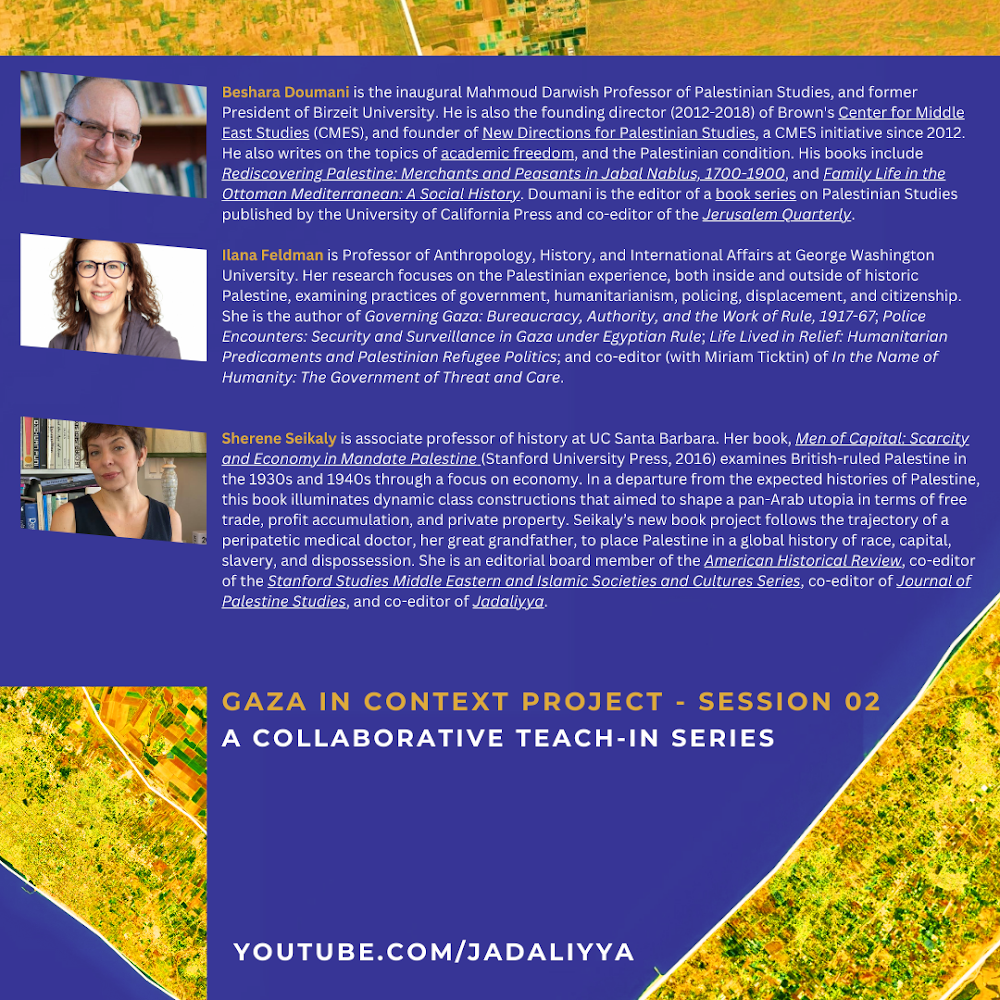Gaza in Context—Session 02: A Collaborative Teach-In Series
Gaza in History
Featuring: Beshara Doumani, Ilana Feldman
Moderated by: Sherene Seikaly
26 October 2023
12:00-1:30 PM EST | 7:00 PM Palestine
We are together experiencing a catastrophic unfolding of history as Gaza awaits a massive invasion of potentially genocidal proportions. This follows an incessant bombardment of a population increasingly bereft of the necessities of living in response to the Hamas attack in Israel on October 7. The context within which this takes place includes a well-coordinated campaign of misinformation and the unearthing of a multitude of essentialist and reductionist discursive tropes that depict Palestinians as the culprits, despite a context of structural subjugation and Apartheid existence on which most Human Rights organizations have established consensus.
The co-organizers below are convening weekly teach-ins and conversations on a host of issues that introduce our common university communities, educators, researchers, and students to the history and present of Gaza, in context.
Join us for the second teach-in installment for Gaza in Context, where our speakers, Beshara Doumani and Ilana Feldman, will explore the broader history of Gaza, and how Gaza fits into the Question of Palestine in the past and the present.
Co-organizers: Arab Studies Institute, Georgetown University’s Center for Contemporary Arab Studies, George Mason University’s Middle East and Islamic Studies Program, Rutgers Center for Middle Eastern Studies, Birzeit University Museum, Harvard’s Center for Middle Eastern Studies, Brown University’s Center for Middle East Studies, University of Chicago’s Center for Contemporary Theory, Brown University’s New Directions in Palestinian Studies, Georgetown University’s Center for Muslim-Christian Understanding, Simon Fraser University’s Centre for Comparative Muslim Studies, Georgetown University-Qatar, American University in Cairo’s Alternative Policy Studies, Middle East Studies’ Global Academy, University of Chicago’s Center for Middle Eastern Studies, CUNY’s Middle East and Middle Eastern American Center, George Mason University’s Center for Global Islamic Studies, University of Illinios Ghicago’s Arab american cultural Center, George Washington University’s Institute for Middle East Studies


Featuring
Beshara Doumani is the inaugural Mahmoud Darwish Professor of Palestinian Studies, and former President of Birzeit University. He is also the founding director (2012-2018) of Brown's Center for Middle East Studies (CMES), and founder of New Directions for Palestinian Studies, a CMES initiative since 2012. He also writes on the topics of academic freedom, and the Palestinian condition. His books include Rediscovering Palestine: Merchants and Peasants in Jabal Nablus, 1700-1900, and Family Life in the Ottoman Mediterranean: A Social History. Doumani is the editor of a book series on Palestinian Studies published by the University of California Press and co-editor of the Jerusalem Quarterly.
Ilana Feldman is Professor of Anthropology, History, and International Affairs at George Washington University. Her research focuses on the Palestinian experience, both inside and outside of historic Palestine, examining practices of government, humanitarianism, policing, displacement, and citizenship. She is the author of Governing Gaza: Bureaucracy, Authority, and the Work of Rule, 1917-67; Police Encounters: Security and Surveillance in Gaza under Egyptian Rule; Life Lived in Relief: Humanitarian Predicaments and Palestinian Refugee Politics; and co-editor (with Miriam Ticktin) of In the Name of Humanity: The Government of Threat and Care.
Sherene Seikaly is associate professor of history at UC Santa Barbara. Her book, Men of Capital: Scarcity and Economy in Mandate Palestine (Stanford University Press, 2016) examines British-ruled Palestine in the 1930s and 1940s through a focus on economy. In a departure from the expected histories of Palestine, this book illuminates dynamic class constructions that aimed to shape a pan-Arab utopia in terms of free trade, profit accumulation, and private property. Seikaly’s new book project follows the trajectory of a peripatetic medical doctor, her great grandfather, to place Palestine in a global history of race, capital, slavery, and dispossession. She is an editorial board member of the American Historical Review, co-editor of the Stanford Studies Middle Eastern and Islamic Societies and Cultures Series, co-editor of Journal of Palestine Studies, and co-editor of Jadaliyya.
